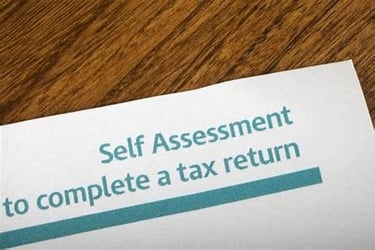When Do Content Creators Need to Register as Self-Employed?
Today's blog answers one of the key questions Content Creators often ask us: "When do I need to register as self-employed?"
TAX ADVICESELF ASSESSMENTINCOME STREAMSMERCHANDISE
Cre8tax
1/21/20252 min read
Your career as a content creator is built on your unique skills, creativity, and the ability to connect with your audience. Whether you’re filming engaging videos, streaming live gameplay, or writing compelling blogs, turning your passion into profit brings with it important tax responsibilities.
One of the key questions you may face is: when do you need to register as self-employed?


What is the threshold for registration and when should you register?
In the UK, if you earn more than £1,000 in a tax year from self-employment, you must register as self-employed with HMRC. This rule applies to content creators who generate income through sponsorships, ad revenue, affiliate marketing, merchandise sales, or any other self-employed activity.
If your earnings from content creation fall below £1,000 in a tax year, you may qualify for the trading allowance, which exempts you from the need to register. However, if your total income exceeds this threshold, registration is mandatory.
You should register as self-employed by 5th October following the end of the tax year in which you started earning over £1,000. For example, if you earned over £1,000 between April 2023 and April 2024, you must register by 5th October 2024.
What does self-employment mean for your taxes?
Once registered as self-employed, you will need to:
Submit a self-assessment tax return each year.
Pay income tax on your profits (after allowable expenses).
Pay Class 2 and potentially Class 4 National Insurance contributions, depending on your earnings.


What counts as 'Income' and 'Deductible Expenses'?
Income for content creators can include:
Payments from sponsorships and brand deals.
Ad revenue from platforms like YouTube or Twitch.
Affiliate marketing commissions.
Sales of merchandise or digital products.
Tips or donations from followers.
Even if your payments come from multiple sources or platforms, all income must be declared.
The good news is that you can deduct allowable business expenses from your income to reduce your taxable profits. Examples of deductible expenses for content creators include:
Equipment costs (e.g., cameras, lighting, microphones).
Software subscriptions.
Internet and phone bills (proportional to business use).
Travel expenses for content-related work.
Home office costs (if applicable).


How can you avoid penalties?
Failing to register as self-employed or submit your tax return on time can result in penalties from HMRC. It’s crucial to stay on top of deadlines and keep accurate records of your income and expenses.
If you’re a content creator earning more than £1,000 a year, registering as self-employed isn’t just a legal obligation—it’s a vital step in managing your finances and building your career. At Cre8tax, we specialise in supporting content creators with tailored tax advice to keep you compliant and stress-free.
Ready to take control of your taxes? Contact us to find out more.
Email us at info@cre8tax.co.uk or call free from a mobile or landline on 0800 0016 878.




